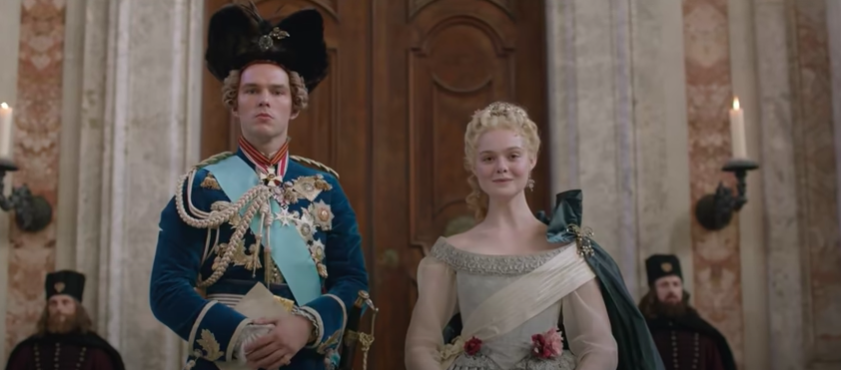Hulu’s new satirical drama series The Great constantly skates fine lines, balancing extreme ridiculousness and irreparable violence and begging you to both love and hate it. Created by Tony McNamara, the series displays the “occasionally true story” of Catherine the Great’s rise to power in 18th-century Russia.
I decided I liked The Great right after watching the first episode, which can’t be said of all well-loved TV series. How many times has someone said to you, “Just get past the first few episodes”? But The Great won me over immediately, despite the fact that my attention span has been reduced to the length of a TikTok these days.
The plot is loosely built around Catherine the Great’s coup against her husband, then-Emperor Peter III, who, historically, was a pretty bad leader. Months after Peter III took the throne, Catherine — who was more progressive than Peter — deposed him, ultimately becoming the longest-ruling female leader Russia has ever seen.
[Read more: Review: Netflix’s ‘Have a Good Trip’ provides a weak buzz at best]
In her first TV lead, Elle Fanning charms as 19-year-old Catherine, and she’s easy to root for. Her subtle yet intelligent lines make the show feel relevant and modern. Equally as charming, Nicholas Hoult’s portrayal of Peter makes you hope the coup doesn’t happen too quickly in the show.
Peter’s character could have easily been based purely in satire — and at first, it largely is — but Hoult gives the role a certain complexity and helps to prevent the 10 episodes from feeling repetitive.
There are moments you forget about The Great’s satirical nature. You’re waiting for the show to take it too far, and in some scenes it’s only moments away from irredeemably tipping the scale of comedy and absurdity to violence and disgust — such as when Peter finds out Catherine plans to teach women to read and decides to punish her for it. But, it never spills over the edges too far in favor of one or the other.
As the show skates between modernity and historical accuracy, it’s hard to ignore the questions of diversity. Though The Great seems to largely ignore the structures of race and sexuality of the time in terms of casting, there are few people of color in the show’s producing and directing roles, which is disappointing considering Hulu was given a Best Workplaces award for diversity in 2019.
[Read more: Twenty hopeful students will compete to find love on ‘UMDisblind’]
Beyond the plot, The Great also shines in its set and costume design. 18th-century Russia holds a distinct elegance in my mind, thanks to watching Anastasia as a kid. The Great doesn’t shy away from using vivid pinks, blues and yellows to create a comparably elegant backdrop for an occasionally bloody plot.
The show’s humor is, at times, too obvious, and other times, subtly brilliant. For every moment you roll your eyes, there’s another to make you want to rewatch a scene just to hear the joke. In the first episode, Catherine’s servant is questioning why she thinks she’s destined for greatness, asking “Why did He make you a woman, then?” Fanning replies, “For comedy, I guess.”
There’s a certain self-awareness to the show — it doesn’t take itself too seriously. But beyond the pink wigs, exaggerated actions, murder plots, love triangles and backstabbing tea sessions, there is something to be learned and inspired from Catherine’s confidence and leadership. At times, the writing takes you outside yourself, and both Fanning and Hoult deliver the words in a way that pulls you in.
And I’ll admit, there is something satisfying about watching Catherine plot to oust someone who represents all the bad traits a leader could possibly have — especially because you know she’ll be successful.



